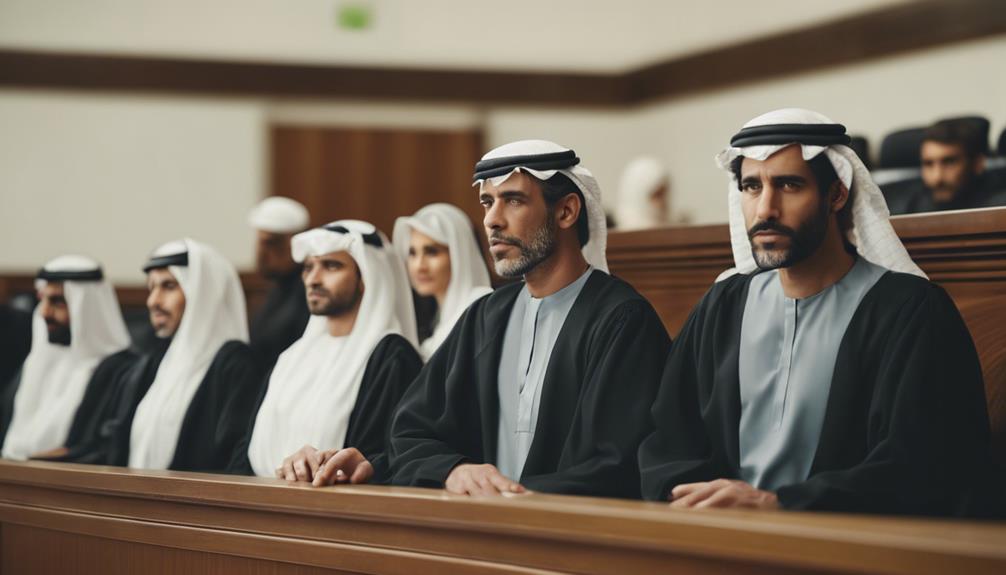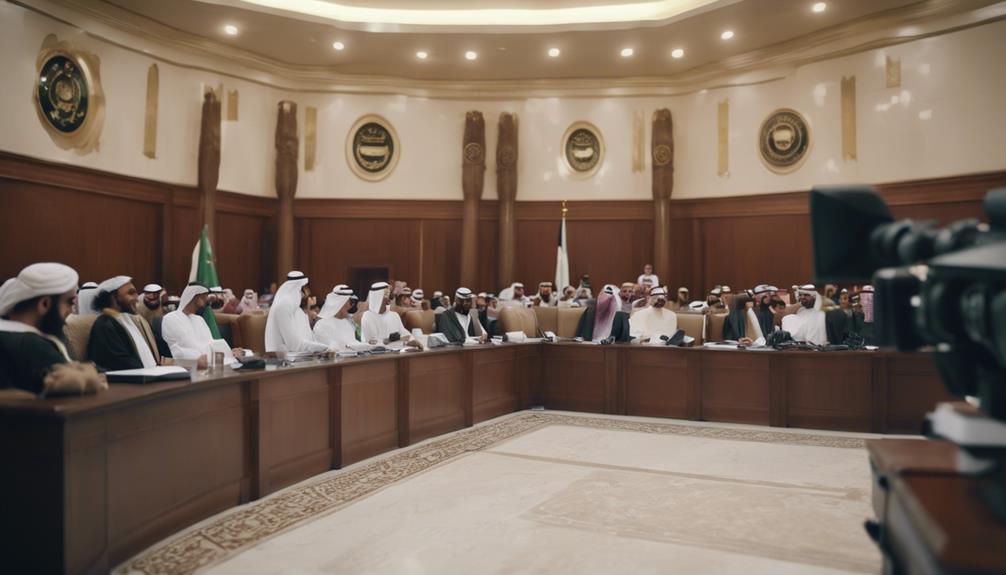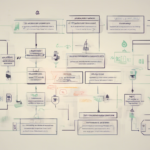The General Court in Jeddah plays a crucial role in the Saudi Arabian legal system. It handles a broad spectrum of cases, including civil disputes, criminal allegations, family law matters, commercial conflicts, and administrative disputes. This wide jurisdiction underscores the court's importance in maintaining justice and settling disputes within the community.
Exploring the intricacies of the cases heard in this court offers valuable perspectives on both the legal framework and societal dynamics of Jeddah.
Civil Disputes

In handling civil disputes, the General Court in Jeddah meticulously examines evidence and legal arguments to ensure fair and just resolutions. Parties involved in civil cases have the option to seek mediation services to resolve their disputes amicably. Mediation can often lead to mutually beneficial agreements without the need for a full trial. However, should mediation not be successful, individuals are entitled to legal representation to advocate for their rights and interests in court proceedings.
The court encourages parties to engage in mediation services as a means of reaching settlements efficiently and cost-effectively. Through mediation, individuals can work with a neutral third party to facilitate productive discussions and negotiations. In cases where legal representation is necessary, individuals can choose to be represented by qualified lawyers who can provide guidance, support, and expertise throughout the legal process.
Criminal Cases
Handling criminal cases, the General Court in Jeddah ensures thorough investigations and adherence to legal procedures to deliver just outcomes for all parties involved. When a criminal case is brought before the court, strict court procedures are followed to guarantee that the rights of the accused are protected and that justice is served. The court meticulously examines evidence, listens to witness testimonies, and evaluates legal arguments presented by both the prosecution and the defense.
Defendants in criminal cases have the right to legal defense, and the General Court in Jeddah respects this fundamental right by providing individuals with the opportunity to be represented by a lawyer. Legal defense strategies are crucial in criminal cases as they aim to challenge the evidence presented by the prosecution and ensure that the defendant's rights are upheld throughout the legal process.
Family Law Matters

Ensuring the preservation of familial rights and responsibilities, the General Court in Jeddah handles a diverse array of family law matters with meticulous attention to legal intricacies and equitable resolutions. The court addresses sensitive issues such as child custody battles, where decisions must prioritize the best interests of the child while considering cultural norms and religious guidelines. Inheritance disputes are also common within the court's jurisdiction, requiring careful examination of legal documents and familial relationships to reach fair outcomes that align with Islamic principles.
Moreover, the General Court in Jeddah oversees the drafting and validation of marriage contracts to ensure compliance with legal requirements and religious stipulations. In cases of divorce proceedings, the court plays a crucial role in mediating settlements, particularly concerning asset division, alimony, and child custody arrangements. Through a combination of legal expertise and cultural sensitivity, the court strives to uphold justice and maintain the integrity of family structures in accordance with Sharia law.
Commercial Disputes
The General Court in Jeddah also addresses commercial disputes with a focus on legal precision and impartial resolution. When it comes to contractual disagreements and business conflicts, the court plays a crucial role in resolving disputes that arise between parties involved in commercial activities. These disputes can range from breach of contract issues to disagreements over business transactions, requiring a thorough examination of the terms and conditions outlined in the agreements.
In handling commercial disputes, the General Court in Jeddah ensures that all parties involved have the opportunity to present their case and provide evidence to support their claims. The court carefully reviews the facts and applicable laws to make fair and impartial decisions aimed at resolving the disputes efficiently.
Furthermore, the court's expertise in commercial law enables it to interpret complex contractual terms and apply relevant legal principles to the cases brought before it. By offering a platform for the resolution of commercial disputes, the General Court in Jeddah contributes to maintaining a stable and trustworthy business environment in the region.
Administrative Disputes

Amidst its diverse caseload, the General Court in Jeddah diligently examines administrative disputes with a focus on upholding legal integrity and ensuring procedural justice. Administrative disputes brought before the court often involve issues of judicial review, where the court assesses the legality and validity of decisions made by governmental bodies or agencies. In these cases, the court carefully scrutinizes the regulatory decisions in question to determine whether they comply with the relevant laws and regulations.
The General Court plays a crucial role in overseeing the actions of administrative authorities, ensuring that they act within the scope of their powers and in accordance with the law. Through the process of judicial review, individuals and organizations can challenge administrative decisions that they believe are unlawful or unjust. By providing a forum for the resolution of administrative disputes, the General Court contributes to upholding the principles of accountability and the rule of law within the administrative system.
Frequently Asked Questions
How Can Individuals File a Complaint or Appeal to the General Court in Jeddah?
Individuals may file complaints or appeals to the General Court in Jeddah by following the prescribed filing process, which typically involves submitting relevant documents and forms. Legal assistance can be sought to navigate this procedure effectively.
What Are the Procedures for Enforcing Court Judgments Issued by the General Court in Jeddah?
Enforcement procedures for court judgments issued by the General Court in Jeddah involve filing an application with the court's enforcement department. The department then takes steps to execute the judgment, which may include asset seizure or other legal measures.
Are There Alternative Dispute Resolution Methods Available for Cases Handled by the General Court in Jeddah?
Alternative dispute resolution methods, such as mediation services and arbitration options, are available for cases handled by the General Court in Jeddah. These conflict resolution techniques offer parties an alternative to traditional courtroom litigation, fostering efficient and collaborative solutions.
Can Individuals Request Legal Aid or Representation for Their Cases at the General Court in Jeddah?
Individuals appearing before the General Court in Jeddah may request legal aid or representation based on court procedures and eligibility criteria. Funding options are available to support those who require assistance in navigating legal matters.
Is There a Specific Timeframe Within Which Cases Must Be Resolved at the General Court in Jeddah?
Court timelines play a crucial role in the efficient resolution of cases. The General Court in Jeddah may have specific timeframes within which cases must be resolved to ensure timely justice delivery and fair outcomes for all parties involved.
Conclusion
In conclusion, the General Court in Jeddah handles a variety of cases including civil disputes, criminal cases, family law matters, commercial disputes, and administrative disputes.
These different types of cases reflect the diverse range of legal issues that come before the court for resolution.
Each case is carefully considered and adjudicated based on the relevant laws and regulations, ensuring justice and fairness in the legal system.










